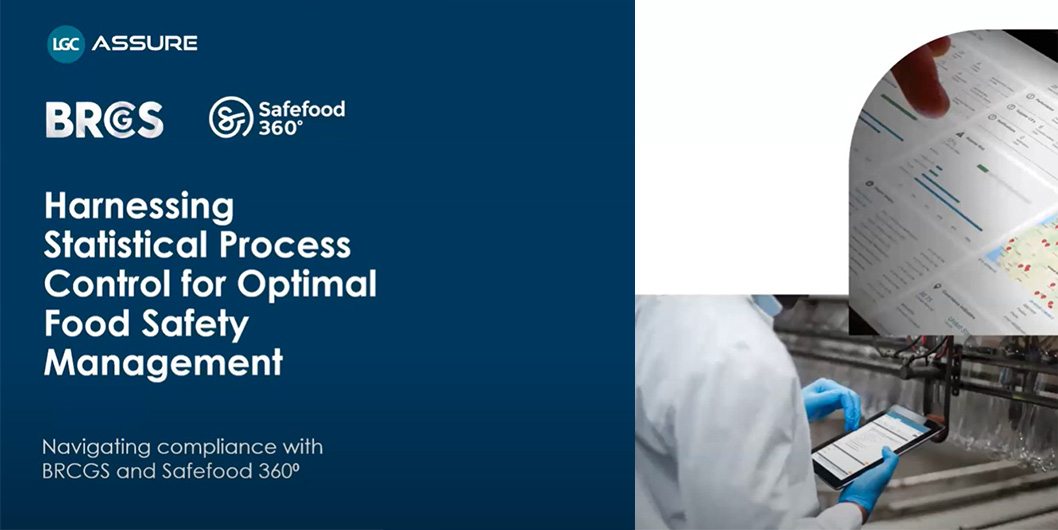Speaker Profile:
Annemarie Joyce is a Senior Product Specialist at Safefood 360°. With a rich history as a Quality Assurance Officer and Quality Controller, she brings a wealth of hands-on experience to the table. Annemarie’s expertise in food safety, combined with her roles in quality assurance, positions her as a leading voice in the industry, guiding businesses towards best practices and innovative solutions.
The Importance of Statistical Process Control (SPC) in Food Safety
In a collaborative effort to provide valuable insights into the food safety industry, BRCGS and Safefood 360° have come together to present a series of educational webinars. This particular session delved deep into the realm of Statistical Process Control (SPC) and its pivotal role in ensuring top-notch food quality. If you’re keen on gaining more technical knowledge in the food safety domain, don’t miss out on our upcoming sessions. Register for the series here. Below is the recap of the webinar series 1:
What is SPC and Why Does It Matter?
SPC, or Statistical Process Control, is a scientific approach that employs statistical methods to oversee and regulate a process. By doing so, it ensures that the process operates efficiently and produces products that conform to specifications. For food businesses, this means a significant reduction in waste and rework, leading to consistent product quality. In an industry where quality can make or break a brand, understanding and implementing SPC is crucial.
The Historical Roots of SPC
The foundations of SPC can be traced back to Walter Edwards Deming, an American engineer who fervently believed in enhancing product quality to capture a larger market share. By understanding the origins and evolution of SPC, businesses can better appreciate its significance in modern-day quality control.
Process Variation and Data Analysis
Every process, no matter how refined, has inherent variations. The challenge lies in understanding and controlling this variation to ensure a consistent output. Through SPC, businesses can monitor these variations, ensuring that the end product remains within the desired specifications, thereby guaranteeing consistent product quality.
Transitioning from Paper to Digital: Safefood 360°
The digital age beckons, and with it comes the need for businesses to transition from traditional paper-based records to digital platforms. Safefood 360° offers a seamless solution, providing a platform for SPC analysis that offers real-time insights, superior data organization, and a more streamlined quality control process.
Process Variation and Data Analysis
Every process, no matter how refined, has inherent variations. The challenge lies in understanding and controlling this variation to ensure a consistent output. Through SPC, businesses can monitor these variations, ensuring that the end product remains within the desired specifications, thereby guaranteeing consistent product quality.
Conculsion:
In the competitive world of food production, staying ahead means embracing tools and methodologies that ensure consistent quality. SPC, with its data-driven approach, offers businesses the chance to achieve this. Join us in our upcoming webinars to further enhance your knowledge and stay at the forefront of food safety innovations. If you are interested in watching this webinar recording, please visit the BRCGS webinar page; for other on-demand webinars, please visit our On-Demand webinar page.
About Safefood 360°: founded in 2010 by a team of food safety experts, offers cutting-edge solutions to address the challenges faced by food-related industries. Combining Food Safety Management and Supplier Quality Management, the platform features over 35 pre-set modules, creating a fast, secure, and audit-ready working environment. Recently acquired by LGC Group, Safefood 360° now benefits from being a part of a wider network of brands, including BRCGS and Informed, all united in their mission to provide science for a safer world. Safefood 360° stands as an innovative software crafted by food safety experts. Subscribe to our newsletter for the latest food safety news. If you would like to have more details about how to ensure the food safety of your company, submit a demo request here.





Leave a Reply
Want to join the discussion?Feel free to contribute!